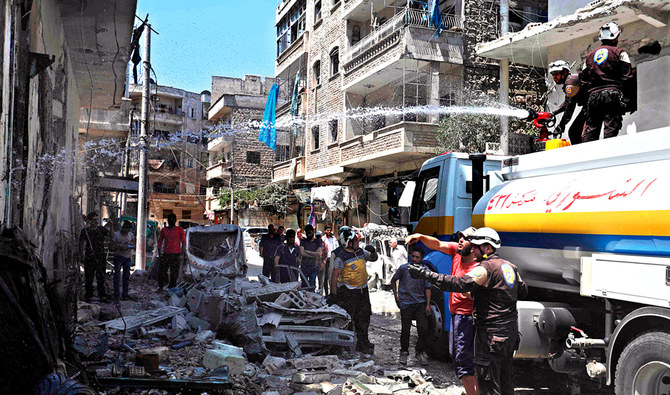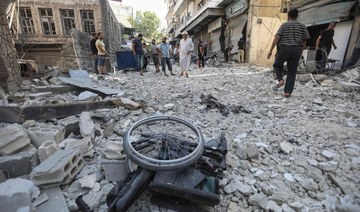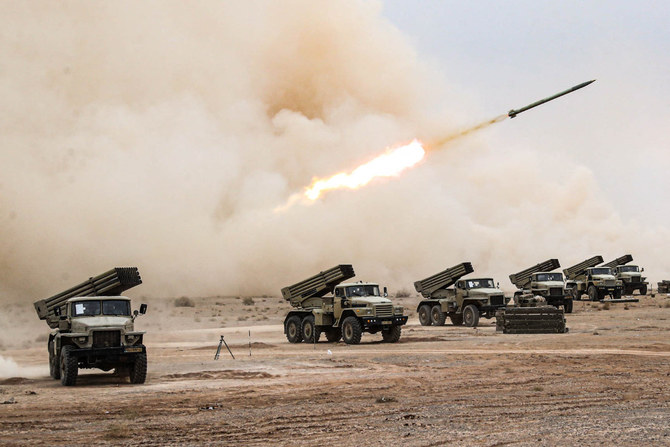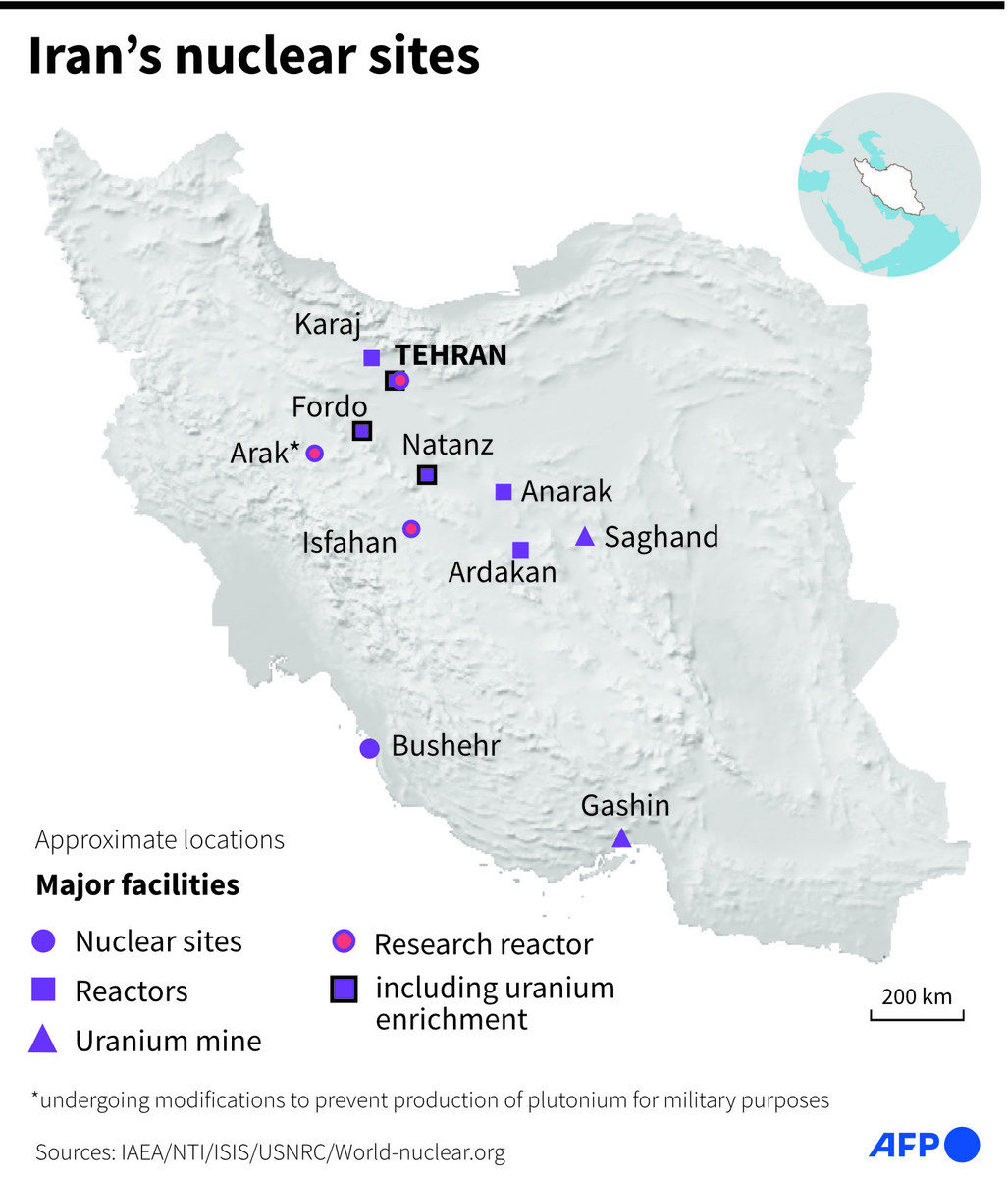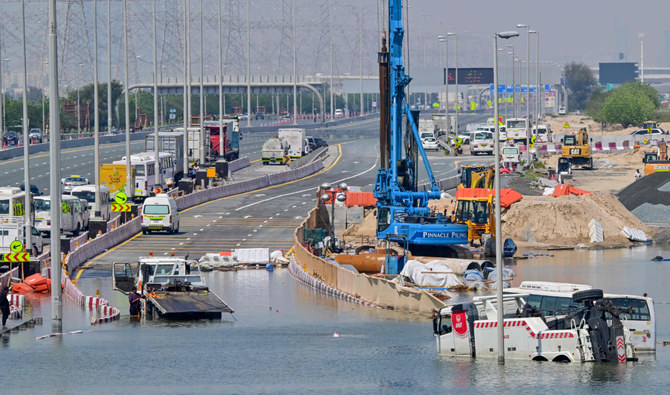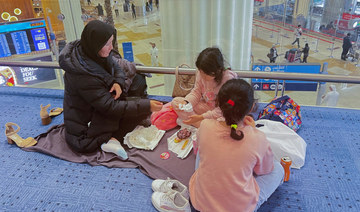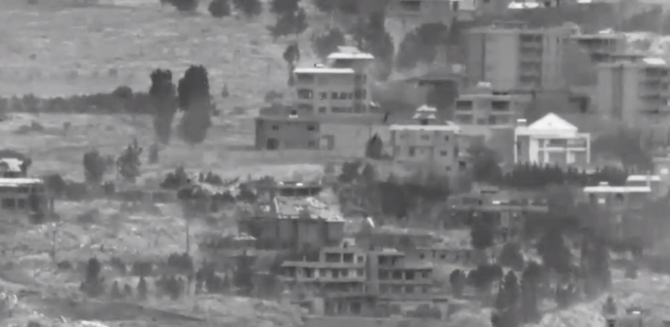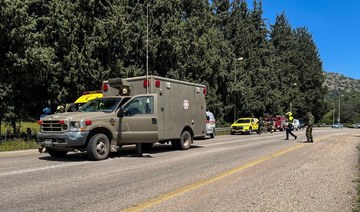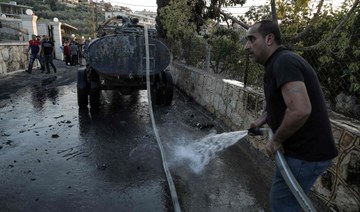BEIRUT: Syrian regime forces have recovered control of two villages in northwestern Syria from militants who withdrew following intensive air and artillery bombardment, the Syrian Observatory for Human Rights said on Monday.
Fighters captured the villages of Al-Jabin and Tel Melah in northern Hama province in early June during a counterattack against regime forces that have been waging a Russian-backed offensive in the area since late April.
An opposition commander in the area confirmed that fighters had withdrawn from Al-Jabin after heavy bombardment.
The pro-Damascus Al-Watan newspaper said the Syrian army had advanced in the area as Syrian and Russian warplanes targeted militant positions and after several days of preparatory fire.
More than 400 civilians have been confirmed killed in the escalation of violence in northwestern Syria over the last three months and more than 440,000 displaced, the UN Office for the Coordination of Humanitarian Affairs said last week.
Ongoing shelling and airstrikes included the use of “indiscriminate weapons, such as barrel bombs,” it said.
The use of these weapons, which are dropped from helicopters, by the Syrian regime troops has been widely recorded in the eight-year conflict.
The targeted area is part of the last major foothold of the revolution against President Bashar Assad, who has vowed to take back “every inch” of Syria. However, his side has failed to make significant gains during the latest campaign.
The Idlib area of the northwest is dominated by Tahrir Al-Sham, the extremists formerly known as the Nusra Front. It is proscribed as a terrorist group by the UN Security Council. Groups backed by Turkey also have a presence in the area.
The Syrian regime has described its operations as a response to militant violations of cease-fire agreements.
Meanwhile, a US-led coalition airstrike killed five terrorists in eastern Syria, a spokesman said, in the first such raid since the collapse of the Daesh’s “caliphate.”
“Coalition forces conducted a strike against a Daesh cell near Busayrah,” a town in Deir Ezzor province, said coalition spokesman James Rawlinson.
The five terrorists were all Syrian, according to the Observatory.
The head of the UN special probe into Daesh’s crimes has called for trials like those at Nuremberg of Nazi leaders to ensure the terrorists’ victims are heard and their ideology “debunked.”
For a year, British lawyer Karim Khan has traveled around Iraq with a team of almost 80 people to gather evidence and witness testimony for the UN body known as UNITAD.
“It’s a mountain to climb,” the human rights specialist said, as the investigative team works to analyze up to 12,000 bodies from more than 200 mass graves, 600,000 videos of Daesh crimes and 15,000 pages from the group’s bureaucracy.
Five years ago, when their self-proclaimed “caliphate” spanned territory the size of the UK, the terrorists imposed their brutal rule over 7 million people across Iraq and Syria with administrations, schools, child soldiers, a severe interpretation of their ideologies and medieval punishments.
Daesh “was not some kind of guerilla warfare or a mobile rebel group ... that’s one aspect that is unusual” for international justice, Khan said from the ultra-secure UNITAD headquarters in Baghdad.
“There was no taboo” for Daesh, Khan said.
“Who could have thought in the 21st century we would see crucifixion or burning a human alive in a cage, slavery, sexual slavery, throwing people off buildings, beheadings.”
And all this captured “with a TV camera.”
Despite the horror, these crimes “are not new,” he said.
“What is new perhaps with Daesh, is that the ideology fuels the criminal group in the same way that fascism fueled the criminal pogroms of Hitler.”
Today almost every day Iraqis are sentenced, often to death, but the victims are not present at the trials and the only charge brought is belonging to Daesh.
But Khan said trials where evidence and testimony are exposed to everyone are the only way to turn the page.
After Daesh, “Iraq and humanity requires its Nuremberg moment,” he said.
Because of Nuremberg, “nobody could be taken seriously if they would espouse the principles of Mein Kampf (written by Adolf Hitler). In fact alarms bells in the public conscience would be aroused if anybody thought the principles of fascism were an alternative political philosophy,” he added.
Nuremberg also “separated the poison of fascism from the German people,” according to Khan.
“It was one of the principles of Nuremberg that there is no collective guilt,” but individuals held responsible, and condemned.
A fair trial for Daesh “can also contribute to separating the poison of IS from the Sunni community,” a minority group in Iraq, Khan said.
And where “Nuremberg also educated Germany (and) Europe,” a Daesh trial would have an “educative effect, not only in the region, but in other parts of the world where communities may be vulnerable to the lies and propaganda of” Daesh.
“That ideology can be debunked, so people that are watching ... can realize a self-evident truth, that it was the most un-Islamic state that we have seen,” Khan added.
UNITAD is working to establish if Daesh actions constitute crimes against humanity, war crimes or genocide, the most serious crimes in international law.
“You will see in the next two months that we are feeding into some prosecutions that are already taking place in some states,” he added.
UNITAD “will build our own cases also” that will permit states which like Germany have universal jurisdiction to deal with crimes regardless of where they were committed and the nationality of the perpetrators and victims.
Some trials are already in motion, notably in France for attacks claimed by Daesh and in Munich where a German woman has been charged with having left a young Yazidi girl “purchased” at a Daesh slave market to die of thirst.
But, Khan said, “Iraq is the primary intended recipient of our evidence, of our information.”
Iraq has already tried thousands of its own nationals arrested on home soil for joining Daesh and has sentenced hundreds to death, whether they fought for the group or not.
“The forum is not so important,” Khan said, as the possibility of an international tribunal has been raised by some but seems unlikely in the near future.
What is essential is that “the victims have the right to have their voice heard.”



